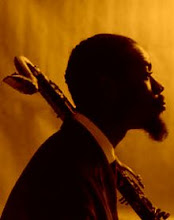When the news of George Shearing's passing arrived, I began considering his place in jazz history; born blind, he was a gifted pianist and composer who wrote over 300 songs including the ubiquitous "Lullaby of Birdland"; the native of Battersea, London, UK was also an innovator, noted for a groundbreaking "block chord" style of piano and the revolutionary configuration of instrumentation that joined his piano with vibes, guitar, bass and drums in a vaunted jazz quintet. Sir George played at the request of kings and queens and 3 U.S. Presidents. In 1996 he was invested by Queen Elizabeth II at Buckingham Palace as an Officer of the Order of the British Empire (O.B.E.) and received his knighthood from The Queen in 2007 . Surely there are others whose accomplishments equaled or exceeded Shearing's during his lifetime. However, there is something much more compelling that makes the story of George Shearing a triumphant one.
Sir George and Queen Elizabeth II, 2007
"Making it" in the highly competitive universe of professional musicianship is a daunting, aeonian undertaking for the best of us and it has to be profoundly formidable without possessing the sense of sight. But tellingly, Shearing viewed his handicap as an asset, as he wrote in his autobiography "Lullaby of Birdland"; "Living in a world in which sound plays the most important part has always been a great stimulus to me as a musician." In fact, the entire thesis of "Lullaby..." is, as Shearing wrote "about my path through that sighted world...in due course as an adult I came to the conclusion that even if I were offered the chance of sight, I would refuse it because it would be so shattering to see everything I had only known as sounds up until that point."
That statement is indicative of Shearing's character; he was the embodiment of the optimism and tough-minded independence of his working-class parents (father James delivered coal, mother Ellen cleaned trains), who must have known their youngest of 9 was quite special because they diverted a portion of their meager earnings toward a piano and accompanying lessons. The cost was a considerable sum for a large family living in a poor neighborhood - "8 pounds", Shearing recalled, adding "I would say the reward, although they weren't around, unfortunately, to reap too many of the benefits, was rather handsome." They also sent George to a small school for the blind where in 4 years, he received his only real music training. After a short time, the only member of the family to pursue a career in music received numerous scholarship offers and he ultimately declined them all, in favor of a more practical pursuit - playing in a local pub, for one pound and five shillings a week. Leaving school to play music in a pub, at 16 years old - was a bold stroke that speaks to Shearing's charm and chutzpah, not to mention the cognizance of a need to provide much needed income for the family coffers. And although he didn't appear to have any clairvoyance (or maybe he did), the gig proved seminal in his eventual fortune and fame; were it not for the confidence he gained and contacts he made early on as working musician, he may have never taken a fortuitous trip to America in 1947.
Shearing playing Lullaby of Birdland in 1987, on the 40th anniversary of arriving in the U.S.
After George Shearing showed that he had the skills to survive in a world of obstacles, the land of opportunity opened it's golden door. Shearing saw the light and extraordinary music began to flow like fine wine; by 1949 he had recorded the Harry Warren/Al Dubin song "September in the Rain" which subsequently posted 900,000 copies sold, almost overnight; in 1952, with the release of "Lullaby of Birdland" he was, at 33 years old, one of the most popular jazz musicians in the world, after being "on the scene" for just 5 years, a blink of an eye in "jazz years". The rest of the story, as it has been said and written many time since his passing on Valentine's Day, contain some of the most heartfelt moments in jazz history.
Sir George and his Lullaby - London, 1955
Let the miraculous story of George Shearing also be, in the words of Joni Mitchell, a "lesson in survival" - for those of us who, in these exceedingly tough times, have difficulty seeing the positive sign posts on the road ahead. Sir George had the foresight and courage of his convictions to believe in the light at the end of the tunnel... and that light also belongs to you and me.



No comments:
Post a Comment